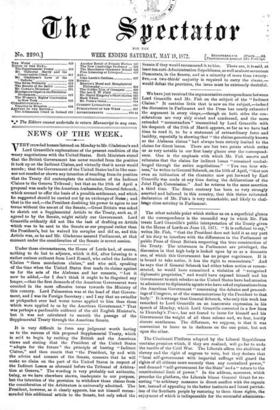The other notable point which strikes us on a superficial
glance at the correspondence is the uncandid way in which Mr. Fish treats Lord Granville's public interpretation of the Treaty given in the House of Lords on June 12, 1871. " It is suthcieut to say," writes Mr. Fish, " that the President does not hold it as any part of his duty to interfere with the differences in the Parliament or public Press of Great Britain respecting the true construction of the Treaty. The utterances in Parliament are privileged, the discussion in that high body is looked upon by us as a domestic one, of which this Government has no proper cognizance. If it is bound to take notice, it has the right to remonstrate." And he says that if General Schenck had either taken notice or remon- strated, he would have committed a violation of " recognised diplomatic proprieties," and would have exposed himself and his Government to such rebukes as the United States have had occasion to administer to diplomatic agents who have asked explanations from the American Government " concerning the debates and proceed- ings of Congress, or of the communications by the President to that body." It is strange that General Schenck, who only this week has remarked to Lord Granville on an inaccurate expression in his speech of Monday, which Lord Granville corrected in a few lines to Thursday's Times, has not feared to incur for himself and his Government the weight of all these solemn and, we fear, hardly sincere anathemas. The difference, we suppose, is that it was convenient to leave us in darkness on the one point, but not upon the other.


































